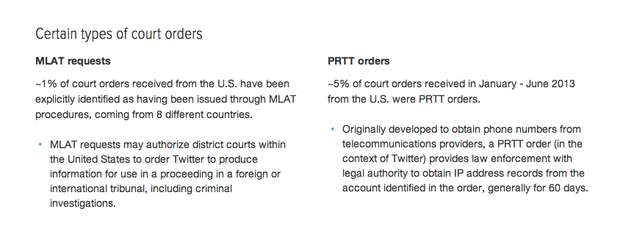Twitter Hints at NSA Requests
In an attempt to further distance itself from the NSA's massive data collection programs, Twitter has disclosed more information than ever in its biannual transparency report, including a hint at how often the secret FISA court comes calling. Unlike other major tech companies, Twitter was not listed as a participant in the PRISM program. (Possibly because Twitter doesn't have that much juicy private intel.) But the company still has to comply when the secret FISA court asks for information. By law, it cannot disclose when or how often this happens — even though tech companies have asked to do just that. Twitter has been vocal about changing that. "It's important to be able to publish numbers of national security requests — including FISA disclosures — separately," the company said recently. But the rules have yet to change.
RELATED: You'll Never Know if the NSA Is Breaking the Law — or Keeping You Safe
Within those constraints, Twitter has broken down its government requests more than ever. As you can see in the chart below, Twitter hands over information in four general categories:
RELATED: NSA Spying Appears to Stem from 550-Word Section of PATRIOT Act
RELATED: Is Google's FTP for the NSA Really Better Than Direct Access?
Of the 902 government requests Twitter got, 10 percent came from court orders — like the secret FISA court that can request American citizens' information — and another 10 percent came from "other." For the first time ever, Twitter further breaks down what a "court order" can mean. They come in the following two flavors:
RELATED: Here's What China Thinks of Ed Snowden and the NSA
RELATED: Very Similar Statements from Facebook and Google on PRISM Still Have Holes
That leaves a large percentage of court orders not accounted for, like FISA orders.
In addition, the "other" category alludes to a more nefarious request. Twitter explains "other" as such: "Requests from law enforcement that do not fall in any of the above categories. "Examples include exigent emergency disclosure requests and other requests received for user information without valid legal process." It's unclear exactly what that means, but Twitter reports that it only complied with 67 percent of total requests.



